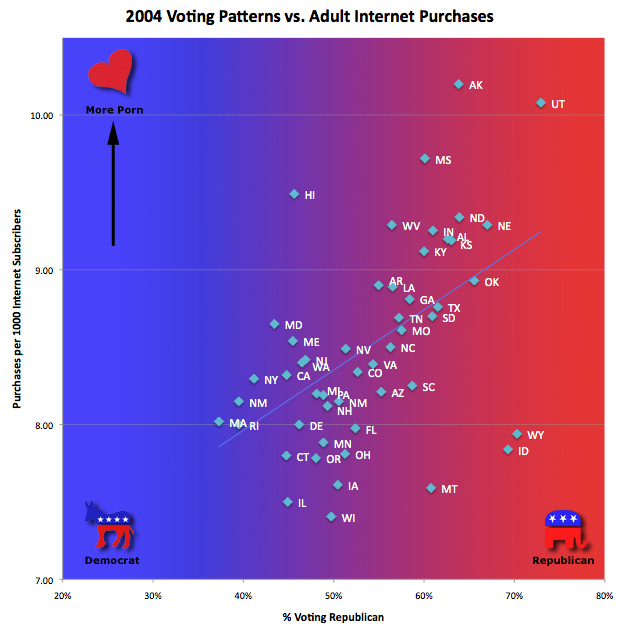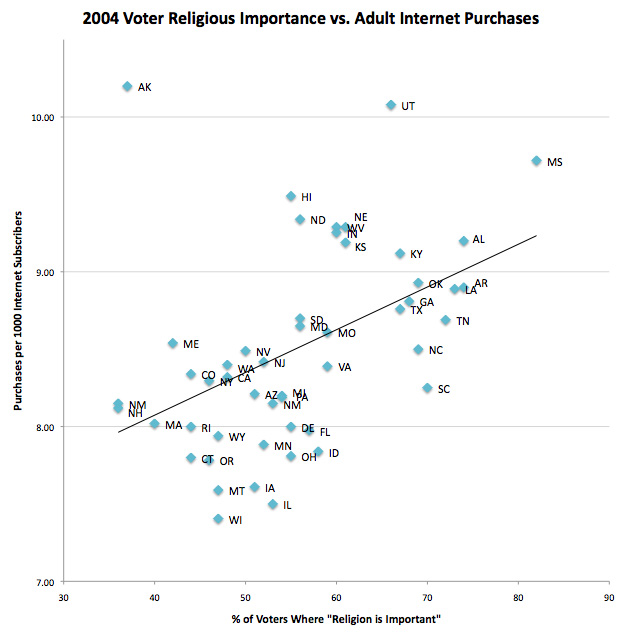Politics and Online Porn
10 Dec 2004
Religion plays a role in politics unique to the modern era. The civil rights movement in the 1960′s alienated many of the religious southern Democrats, and the Moral Majority of the late 1970′s more closely aligned religious interests with political interests of Republicans. As a result, religious Americans have shifted from voting evenly between a two-party dichotomy and more consistently with Republicans. This isn’t news.
Simultaneously, there has been an explosion in online e-commerce, security, and data transfer, which means you can buy just about anything you want from the safety and privacy of your own home.
It’s hard not to notice the “moral” rhetoric of both parties in this election cycle. Abortion, gay marriage, and other wedge issues have driven the narrative on both sides, instead of coherent arguments for or against specific economic, and foreign and domestic policies. Emotion and righteousness got a lot of people out to the polling booths last month. Some Republicans are even championing their recent victory as a victory of good over evil.
I’ve been curious for a while to know if there’s sociological value in examining internet trends more closely. Lots of data is readily available to all, but some of the newest and most relevant to the current political discourse is that surrounding pornography consumption.
The Process
I’ve been managing credit card processing for a huge portion of all online adult websites for a number of years. We’ve processed tens of millions of transactions. We take the security and identity of users and partners very seriously, so for the sake of the privacy of buyers and the private parent company, I’m only using aggregate quantities for this analysis – quantities that are already reported to the IRS, credit bureaus, banks, and shared with advertising and non-advertising partners.
Step 1 – I consolidated all purchases made during the last presidential election cycle (2000-2004) by tracking only one transaction per anonymous individual. Subscriptions and multiple purchases didn’t count towards more porn bought. Consumers numbers were then totaled by county, then state.
Step 2 – At first glance, the number of consumer data points for each state was very closely correlated to its internet penetration. The more internet access a state’s population had, the more online porn it bought. Not surprising, since these are internet purchases.
Step 3 – Data got interesting when consumer data points were compared to the number of internet users instead of the entire state population. I’d imagine you could drill deeper into other demographics – gender, age, marital status – to get even more interesting results, but we don’t store this information and wouldn’t use it if we did.
Step 4 – Comparing purchases per 1000 internet users to election results and election survey results produced a fairly highly correlation (0.51 and 0.46 in the charts below with R-squared’s of 0.31 and 0.21, to be exact). For simplicity’s sake, I only used binary presidential voting results. Here’s a graphs of the data points with a basic single variable linear regression trend line included:

Conclusion: Republicans buy more online porn, but not necessarily because they’re Republican.
One factor to consider in further analysis: people that live in close geographic proximity to each other (dense urban areas) tend to vote Democrat while those that live in sparsely populated areas tend to vote Republican. It’s possible that if you’re more isolated, you might find online porn more appealing than someone who’s constantly surrounded by people (the Alaska data point hints at this – they buy the most porn, but vote only mildly Red). It’s also possible people surrounded by others have more incentive or means to find free alternatives.

Conclusion: There is a positive correlation between those that consider themselves very religious and those that buy online porn. Explaining this is a little trickier.
Population density may play a role, but there have to be some other factors involved; it’s certainly not as obvious as “religious people are statistically hypocritical.” It would be interesting to see numbers on what people think religion says about pornography, numbers on cheating, and offline/real-world alternatives to online adult entertainment before drawing conclusions. Maybe porn is a viable substitute for infidelity, or at least an explanation for the trend line.
Sources:
U.S Census Bureau CPS Computer and Internet Use in the United States: 2003
Voting and voter survey results: USA Today 2004 Presidential Election Results by County






















